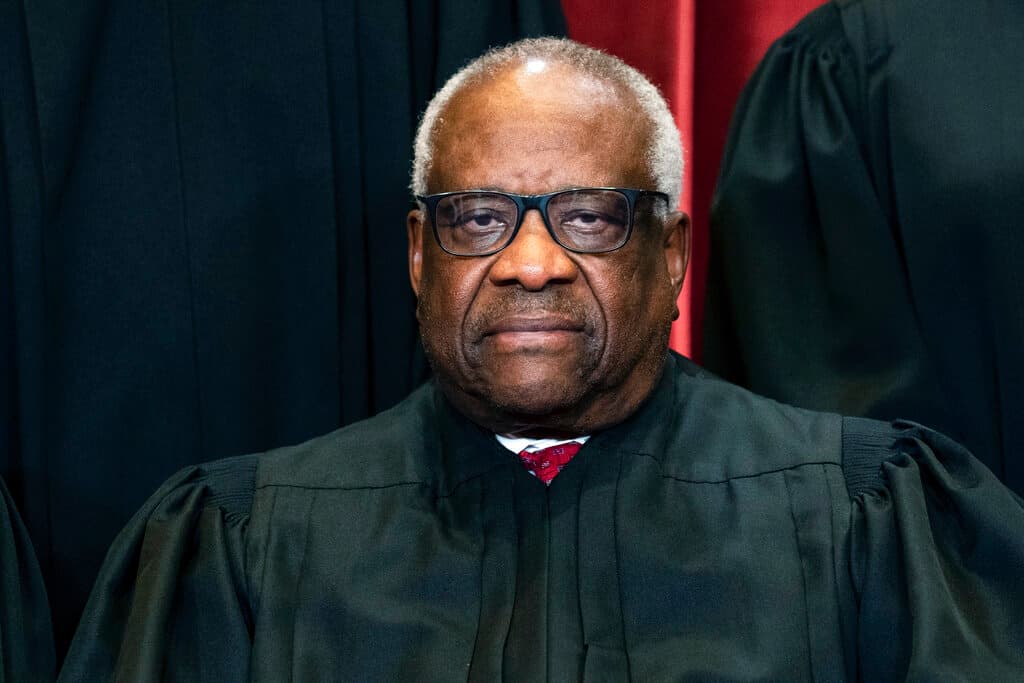Will It Be Congress or the Court That Steps Up on Section 230?
After Buffalo, get ready for tort lawyers to press claims against online platforms — and to find at the Supreme Court a receptive ear on the cranium of Justice Clarence Thomas.

One question after the murders at Buffalo is how far our politicians will go to blame the online platforms on which the shooter allegedly became radicalized. Governor Hochul calls on these firms to take “legal responsibility” to stop “hate” on their platforms. Get ready for the tort lawyers to press claims against these technology companies — and to find at the Supreme Court a receptive ear on the cranium of Justice Clarence Thomas.
It’s no accident, we suspect, that of the nine justices of the Supreme Court, it is the most self-confident, clear-headed, and experienced sage — this is how we view Justice Thomas — who has been signaling that the time has come to confront Section 230. It’s the section of the Communications Decency Act of 1996 that shelters tech companies from lawsuits and liability to the degree that they are operating as common carriers.
The grizzled guardian of the Constitution has piped up several times on this head. In 2020, he called for the court to examine whether “this increasingly important statute aligns with the current state of immunity enjoyed by Internet platforms.” He noted that “laws governing illegal content” draw a line between “publishers or speakers” and “distributors” — the difference between, say, a newspaper and a newsstand.
“Publishers or speakers were subjected to a higher standard,” Justice Thomas said, “because they exercised editorial control.” They are “liable for transmitting illegal content.” Distributors act “as a mere conduit.” They pass along “far more content than they could be expected to review.” Thinking of tech companies as distributors gave them wide freedom and has shaped the freewheeling culture of today’s online marketplace.
Yet Justice Thomas foresaw the potential downside of such broad immunity. He pointed to concerns over online posting of “potentially defamatory statements” or even “illegal child pornography.” He noted a case in which an Internet company came under fire for letting its users “post classified ads for ‘Escorts,’” raising concerns the firm had “deliberately structured its website to facilitate illegal human trafficking.”
In 2021, in a concurrence in a case tied to President Trump’s Twitter account, Justice Thomas upped his scrutiny of Section 230. The justice cited doubts over “applying old doctrines to new digital platforms.” Justice Thomas noted it was “odd” to say that the president’s Twitter account resembled “a constitutionally protected public forum,” seeing as “a private company has unrestricted authority to do away with it.”
Plus, too, Justice Thomas observed that such sweeping control over speech was at odds with claims by online firms merely to be “organizations that focus on distributing the speech of the broader public.” Hence “if the aim is to ensure that speech is not smothered,” then it was time to start looking more closely at the actions of “the dominant digital platforms themselves” — like Twitter, which has silenced Mr. Trump.
Justice Thomas does not confine his concerns about the spread of irresponsible or erroneous content to internet companies. In July, he penned a dissent calling for “a second look at the Court’s doctrine” in New York Times v. Sullivan, which has granted the press broad immunity over libel claims brought by public persons. He cited “Pizzagate” to illustrate the damage done when falsehoods are disseminated in the news or on social media.
How to handle Section 230 has exposed divisions among Republicans in Congress. On the one hand, some assail big online technology firms like Facebook and Twitter for discriminating against right-of-center causes and ideas online. Witness the censorship of the New York Post’s scoops on the Hunter Biden laptop. On the other hand, some on the right object, per se, to more regulation of private enterprise.
In March, Justice Thomas asked why Section 230 “should protect Facebook from liability for its own ‘acts and omissions.’” At Buffalo today, President Biden backed moves to curb the “exploitation of the internet to recruit and mobilize terrorism” and said, “we just need to have the courage to do that, to stand up.” So will it be Congress or the Supreme Court that has the gumption to address the problem of Section 230?
________
This editorial has been updated from the bulldog.

